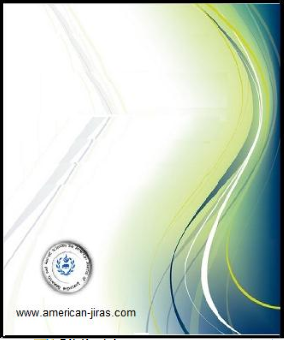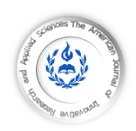
GENERAL INFORMATION
| HOME | ABOUT US | ARCHIVE | AIMS AND SCOP | AUTHORS | REVIEW | SUMIBMIT MANUSCRIPT | EDITORIAL BOARED | PUBLICATION FEE |

| HOME || ABOUT US || ARCHIVES || AIMS AND SCOP || AUTHORS || REVIEW|| SUBMIT MANUSCRIPT || EDITORIAL BOARD |

| Info-AJIRAS-® Journal ISSN 2429-5396 (Online) / Reference CIF/15/0289M |
American Journal of Innovative Research & Applied Sciences

|
American Journal of innovative
Research & Applied Sciences
Research & Applied Sciences
ISSN 2429-5396 (Online)
OCLC Number: 920041286
OCLC Number: 920041286
Authors Contact
*Correspondant author and authors Copyright © 2024:
| Ahmed Idrissi Ouadrhiri 1* | et | Ibrahim Bouzalmat 2.3 |
Affiliation.
1. Faculté des Lettres et des Sciences Humaines | Université Abdelmalek Essaâdi | Tétouan | Maroc |
2. IMAG, Univ Montpellier, CNRS | Montpellier | France |
3. UMR SAVE, INRAE, Bordeaux Sciences Agro | Villenave d’Ornon | France |
This article is made freely available as part of this journal's Open Access:
| DOI: : https://doi.org/10.5281/zenodo.14171561 |
*Correspondant author and authors Copyright © 2024:
| Ahmed Idrissi Ouadrhiri 1* | et | Ibrahim Bouzalmat 2.3 |
Affiliation.
1. Faculté des Lettres et des Sciences Humaines | Université Abdelmalek Essaâdi | Tétouan | Maroc |
2. IMAG, Univ Montpellier, CNRS | Montpellier | France |
3. UMR SAVE, INRAE, Bordeaux Sciences Agro | Villenave d’Ornon | France |
This article is made freely available as part of this journal's Open Access:
| DOI: : https://doi.org/10.5281/zenodo.14171561 |

| ISSN: 2429-5396 (e) | https://www.american-jiras.com | |
| Web Site Form: v 0.1.05 | JF 22 Cours, Wellington le Clairval, Lillebonne | France |
| Web Site Form: v 0.1.05 | JF 22 Cours, Wellington le Clairval, Lillebonne | France |
Abstarct7-December-2023

NOVEMBER | ISSUE N° 5 | 2024 |
| ARTICLES | Am. J. innov. res. appl. sci. Volume 19, Issue - 5 (Pages 1-15 (November, 2024)
| ARTICLES | Am. J. innov. res. appl. sci. Volume 19, Issue - 5 (Pages 1-15 (November, 2024)
RESUME
Introduction : La révolution numérique et la globalisation ont profondément transformé les pratiques sociales, économiques et culturelles dans notre société contemporaine. Le secteur éducatif, particulièrement l'enseignement des langues, se trouve au cœur de ces mutations technologiques. Les acteurs éducatifs font face à de nouveaux défis qui nécessitent une adaptation des pratiques pédagogiques traditionnelles. Objectif : Cette étude vise à analyser et optimiser l'intégration de l'intelligence artificielle (IA) dans la didactique du français au Maroc, en identifiant les obstacles et les opportunités liés à son implémentation dans les trois phases du processus d'enseignement : la planification, la gestion et l'évaluation. Méthodes : Une approche méthodologique qualitative-descriptif transversal a été adoptée, auprès de 72 enseignants de français et une analyse des pratiques pédagogiques. L'étude s'est focalisée sur l'évaluation des compétences numériques, l'utilisation actuelle des outils d'IA et les besoins en formation professionnelle. Résultats : L'analyse révèle une forte concentration des participants dans l'enseignement secondaire (84,7%), avec une population relativement jeune (40,3% entre 20-30 ans). Les résultats mettent en évidence des disparités significatives dans l'utilisation des outils d'IA et soulignent des besoins spécifiques en formation continue. Conclusion : L'étude propose un cadre méthodologique pour l'intégration efficace de l'IA dans l'enseignement du français au Maroc. Les recommandations incluent le développement de programmes de formation continue adaptés, la création de ressources pédagogiques numériques standardisées et l'établissement d'un système d'évaluation assistée par l'IA.
Mots clés : Intelligence artificielle, didactique du français, formation professionnelle, innovation pédagogique, Maroc.
ABSTRACT
Introduction: The digital revolution and globalization have profoundly transformed social, economic, and cultural practices in our contemporary society. The education sector, particularly language teaching, is at the heart of these technological changes. Educational stakeholders face new challenges that require adaptation of traditional pedagogical practices. Objective: This study aims to analyze and optimize the integration of artificial intelligence (AI) in French language teaching in Morocco by identifying obstacles and opportunities related to its implementation across the three phases of the teaching process: planning, management, and evaluation. Methods: A qualitative-descriptive cross-sectional methodological approach was adopted, involving 72 French teachers and an analysis of pedagogical practices. The study focused on assessing digital competencies, current use of AI tools, and professional development needs. Results: The analysis reveals a high concentration of participants in secondary education (84.7%), with a relatively young population (40.3% between 20-30 years old). The results highlight significant disparities in the use of AI tools and emphasize specific needs in continuing education. Conclusion: The study proposes a methodological framework for the effective integration of AI in French language teaching in Morocco. Recommendations include the development of adapted continuing education programs, the creation of standardized digital educational resources, and the establishment of an AI-assisted evaluation system.
Keywords: Artificial Intelligence, French language teaching, professional development, pedagogical innovation, Morocco.
Introduction : La révolution numérique et la globalisation ont profondément transformé les pratiques sociales, économiques et culturelles dans notre société contemporaine. Le secteur éducatif, particulièrement l'enseignement des langues, se trouve au cœur de ces mutations technologiques. Les acteurs éducatifs font face à de nouveaux défis qui nécessitent une adaptation des pratiques pédagogiques traditionnelles. Objectif : Cette étude vise à analyser et optimiser l'intégration de l'intelligence artificielle (IA) dans la didactique du français au Maroc, en identifiant les obstacles et les opportunités liés à son implémentation dans les trois phases du processus d'enseignement : la planification, la gestion et l'évaluation. Méthodes : Une approche méthodologique qualitative-descriptif transversal a été adoptée, auprès de 72 enseignants de français et une analyse des pratiques pédagogiques. L'étude s'est focalisée sur l'évaluation des compétences numériques, l'utilisation actuelle des outils d'IA et les besoins en formation professionnelle. Résultats : L'analyse révèle une forte concentration des participants dans l'enseignement secondaire (84,7%), avec une population relativement jeune (40,3% entre 20-30 ans). Les résultats mettent en évidence des disparités significatives dans l'utilisation des outils d'IA et soulignent des besoins spécifiques en formation continue. Conclusion : L'étude propose un cadre méthodologique pour l'intégration efficace de l'IA dans l'enseignement du français au Maroc. Les recommandations incluent le développement de programmes de formation continue adaptés, la création de ressources pédagogiques numériques standardisées et l'établissement d'un système d'évaluation assistée par l'IA.
Mots clés : Intelligence artificielle, didactique du français, formation professionnelle, innovation pédagogique, Maroc.
ABSTRACT
Introduction: The digital revolution and globalization have profoundly transformed social, economic, and cultural practices in our contemporary society. The education sector, particularly language teaching, is at the heart of these technological changes. Educational stakeholders face new challenges that require adaptation of traditional pedagogical practices. Objective: This study aims to analyze and optimize the integration of artificial intelligence (AI) in French language teaching in Morocco by identifying obstacles and opportunities related to its implementation across the three phases of the teaching process: planning, management, and evaluation. Methods: A qualitative-descriptive cross-sectional methodological approach was adopted, involving 72 French teachers and an analysis of pedagogical practices. The study focused on assessing digital competencies, current use of AI tools, and professional development needs. Results: The analysis reveals a high concentration of participants in secondary education (84.7%), with a relatively young population (40.3% between 20-30 years old). The results highlight significant disparities in the use of AI tools and emphasize specific needs in continuing education. Conclusion: The study proposes a methodological framework for the effective integration of AI in French language teaching in Morocco. Recommendations include the development of adapted continuing education programs, the creation of standardized digital educational resources, and the establishment of an AI-assisted evaluation system.
Keywords: Artificial Intelligence, French language teaching, professional development, pedagogical innovation, Morocco.
| Ahmed Idrissi Ouadrhiri 1* | et | Ibrahim Bouzalmat 2.3 |. Am. J. innov. res. appl. sci. 2024; 19(5):01-15.